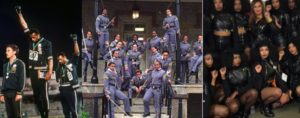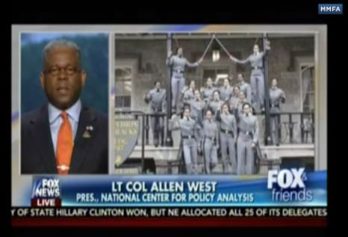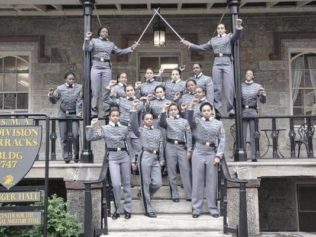Is Black pride incompatible with the U.S. military? The United States Military Academy at West Point decided there will be no punishment for the 16 Black female cadets who posed for a photograph with raised fists in a Black Lives Matter stance. The institution concluded that the cadets’ gesture was a sign of unity and pride, as The New York Times reported.
At issue was whether the photo violated Army regulations that ban partisan political activities while in uniform. An inquiry by the Army found the cadets’ action did not violate policy, but nonetheless was “inappropriate.”
“As members of the Profession of Arms, we are held to a high standard, where our actions are constantly observed and scrutinized in the public domain,” said Lt. Gen. Robert L. Caslen, Jr., academy superintendent, in a letter. “We all must understand that a symbol or gesture that one group of people may find harmless may offend others. As Army officers, we are not afforded the luxury of a lack of awareness of how we are perceived.”
Caslen’s letter also revealed the double standard to which the Black women were being held, in an institution whose student body is 80 percent male and 70 percent white. Apparently, raising one’s fist will escape scrutiny if that person is not Black or acting as such.
“Last December, on the night before the Army-Navy game, I joined hundreds of staff and graduates in raising our fist in support of the Army football team during the Army-Navy pep rally video,” Caslen said. “The time, place and manner of a symbol can also hold significant meaning and influence perception.”
However, the women will receive additional counseling before graduating this month, according to the Army Times.
Some observers associated with the military called for discipline and even dismissal for the cadets, the largest group of Black women to graduate from the public military academy. Former U.S. Representative Allen West, a Black conservative Tea Party supporter and retired Army officer, wrote on his blog that the women should apologize. West claimed that had these cadets been white men who took a picture with a Confederate flag, they would be in danger of not graduating and receiving their commission as an Army officer.
“These young women carry on the legacy of Henry O. Flipper, the first Black graduate of West Point. All he wanted was to serve his nation and be an Army officer. Thanks to him, these women can be there at West Point, and I was able to become an Army officer,” West said. “These women must learn that #SoldierLivesMatter. And the only power they should ever advocate is American power because that’s what they’re being called to support and defend: our strength, which is in our people,” he added.
However, others such as Mary Tobin, a Black woman who graduated from West Point in 2003, support the cadets.
“No matter what way we slice it, if a black person displays ‘the fist,’ it is immediately associated with being a symbol of either pride or racism and there is no way around that,” Tobin wrote on Facebook. “To shrink your blackness is to avoid all talks of what it really means to be black at West Point, put your head down, and focus on graduation. It is the worst kind of coping mechanism, because I have rarely seen it result in anything other than disdain for our alma mater,” she added, noting it was not her burden in “trying to convince my classmates who were racist, that I wasn’t garbage…. It also wasn’t my burden to help others value my experiences or my existence.”
Apparently, Black fists scare white people, and have for quite some time, conjuring up images of Black protest and revolution. This was the case when Nelson Mandela did it, and it most certainly was the case when athletes John Carlos and Tommie Smith dared to do it at the 1968 Summer Olympic Games in Mexico City. And even Beyoncé received criticism and condemnation for the Black Power-themed performance of her song “Formation” at this year’s Super Bowl halftime show. In her performance, Beyoncé was flanked by an army of women in Afros and Black Panther uniforms, with clenched fists. For her gesture to Black activism, the performer was met with police threats to boycott her tour, and charges that she was responsible for a rise in police deaths.



